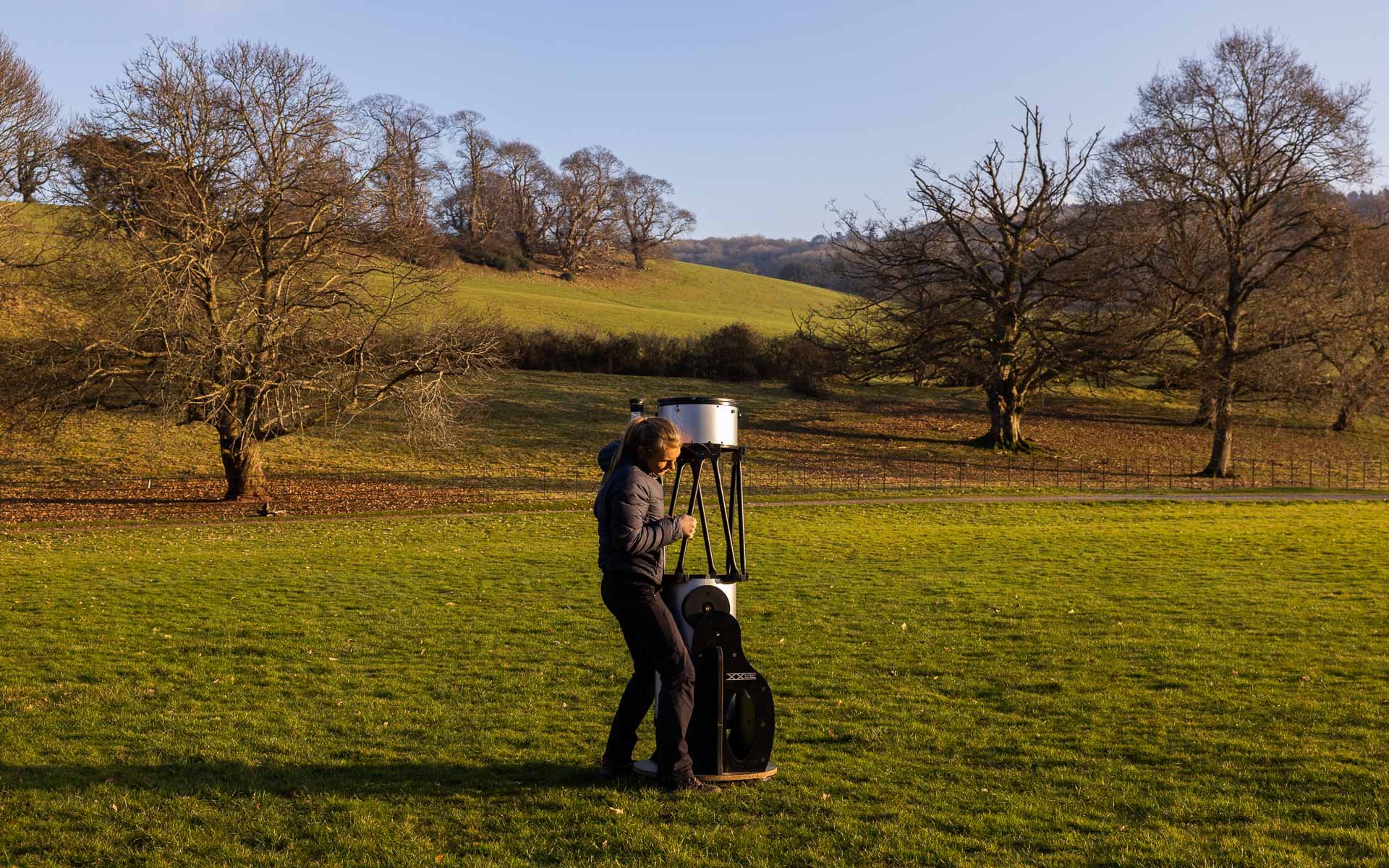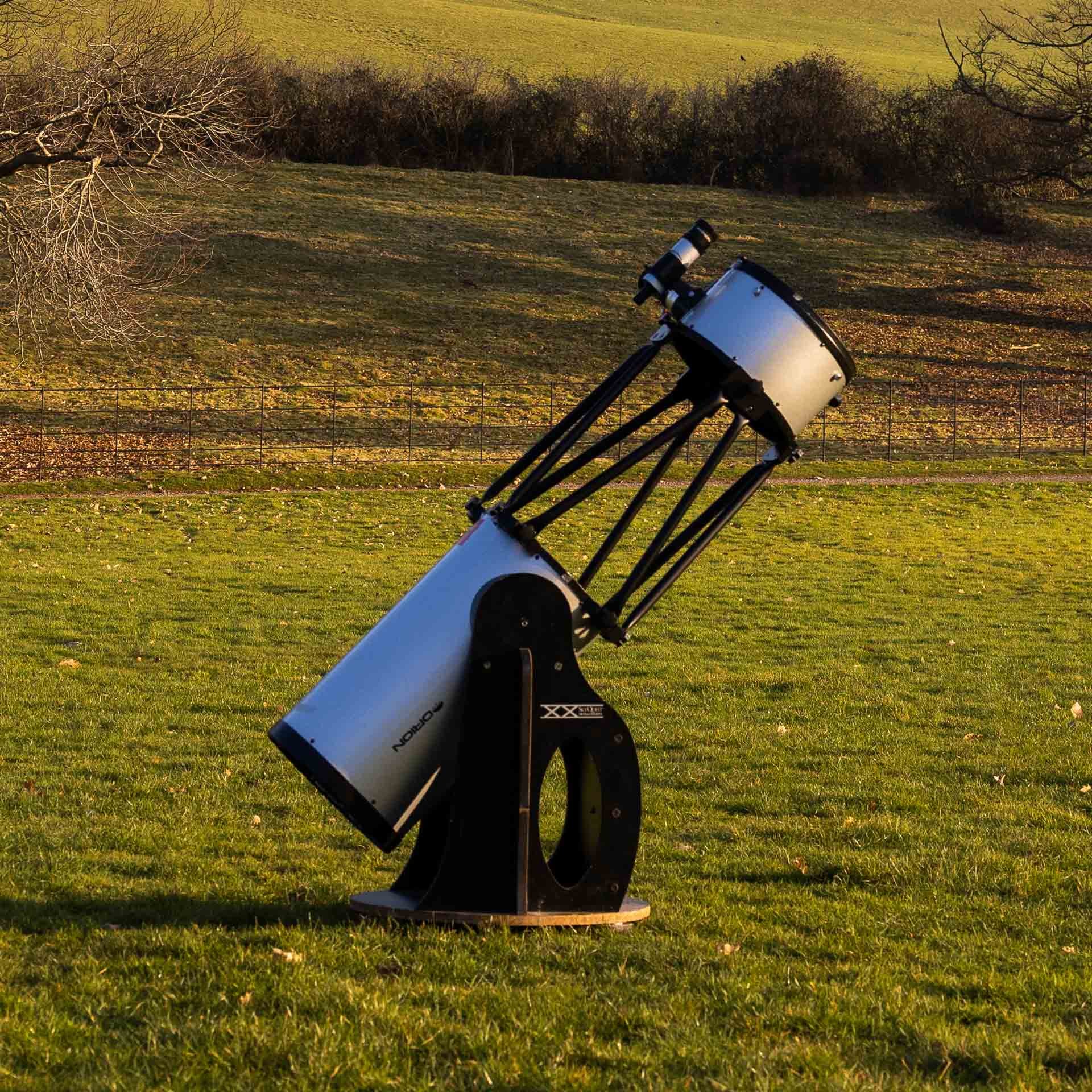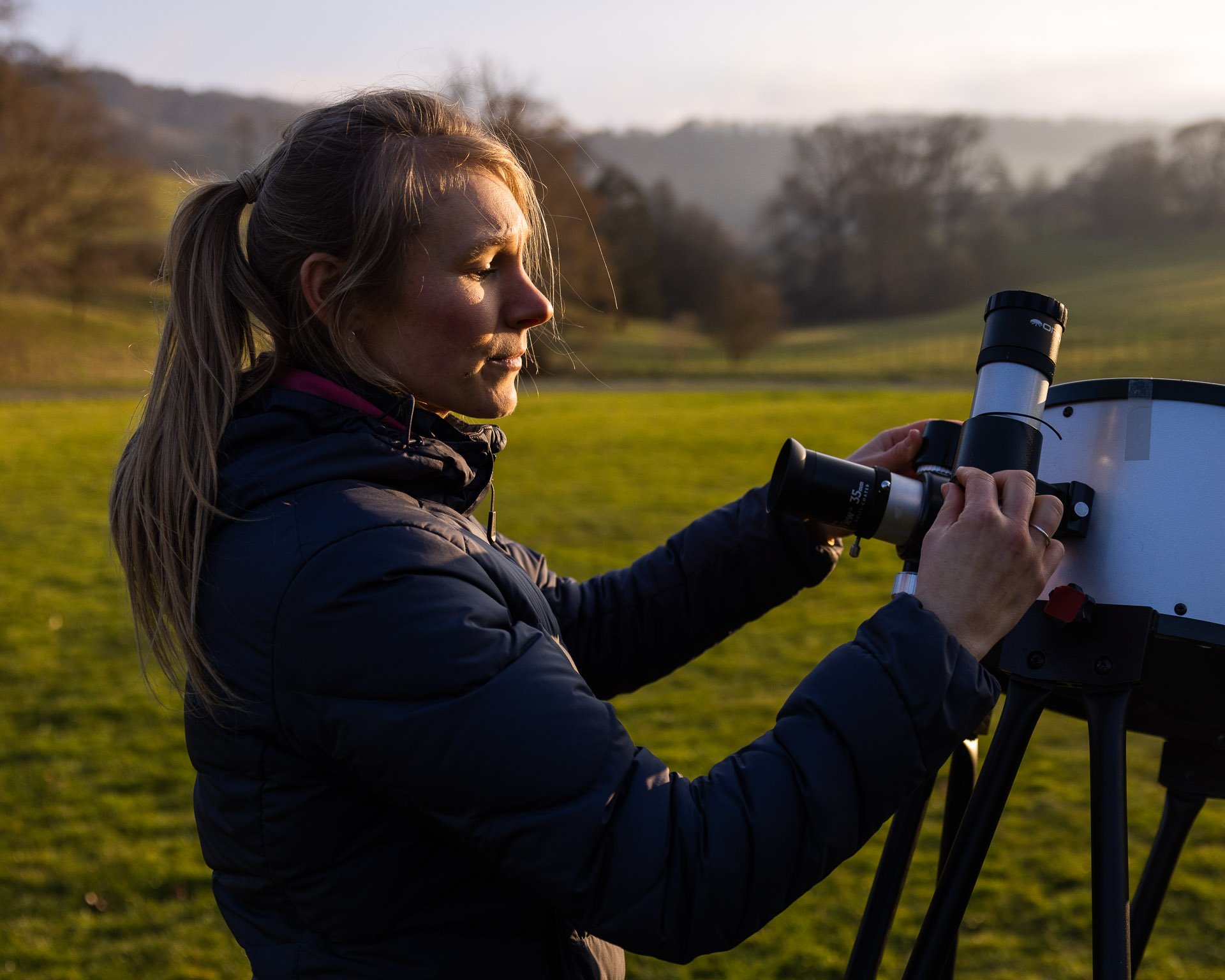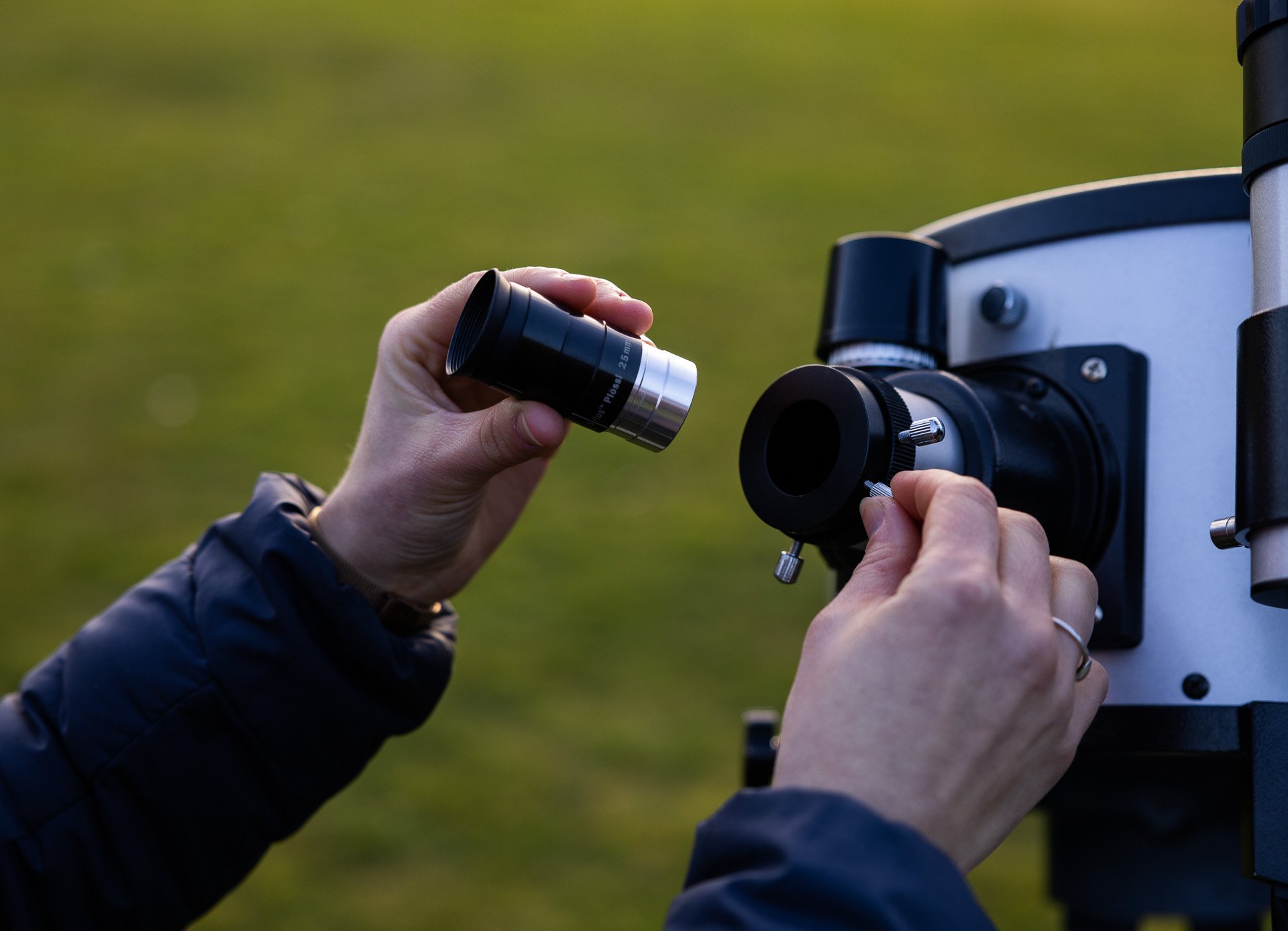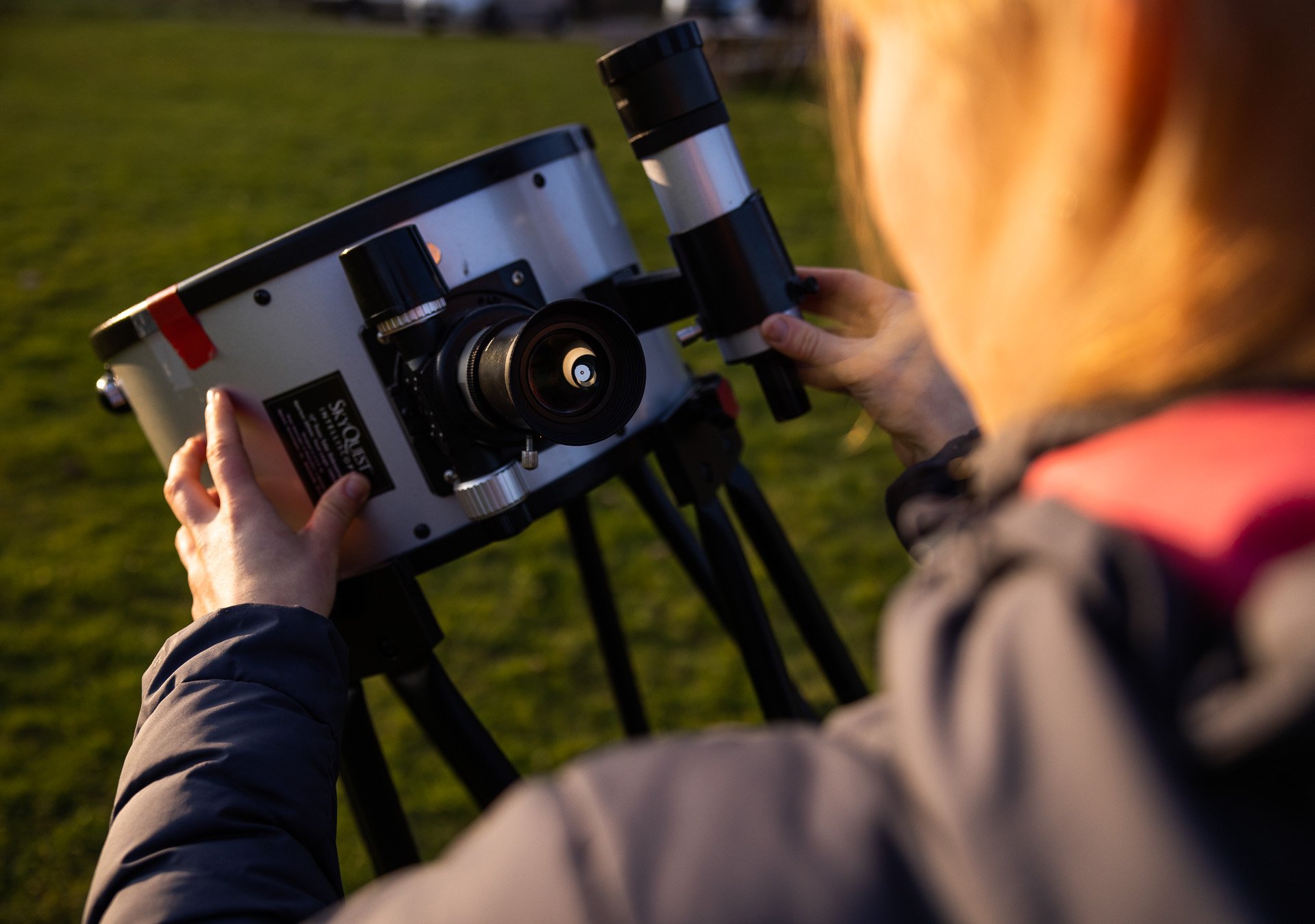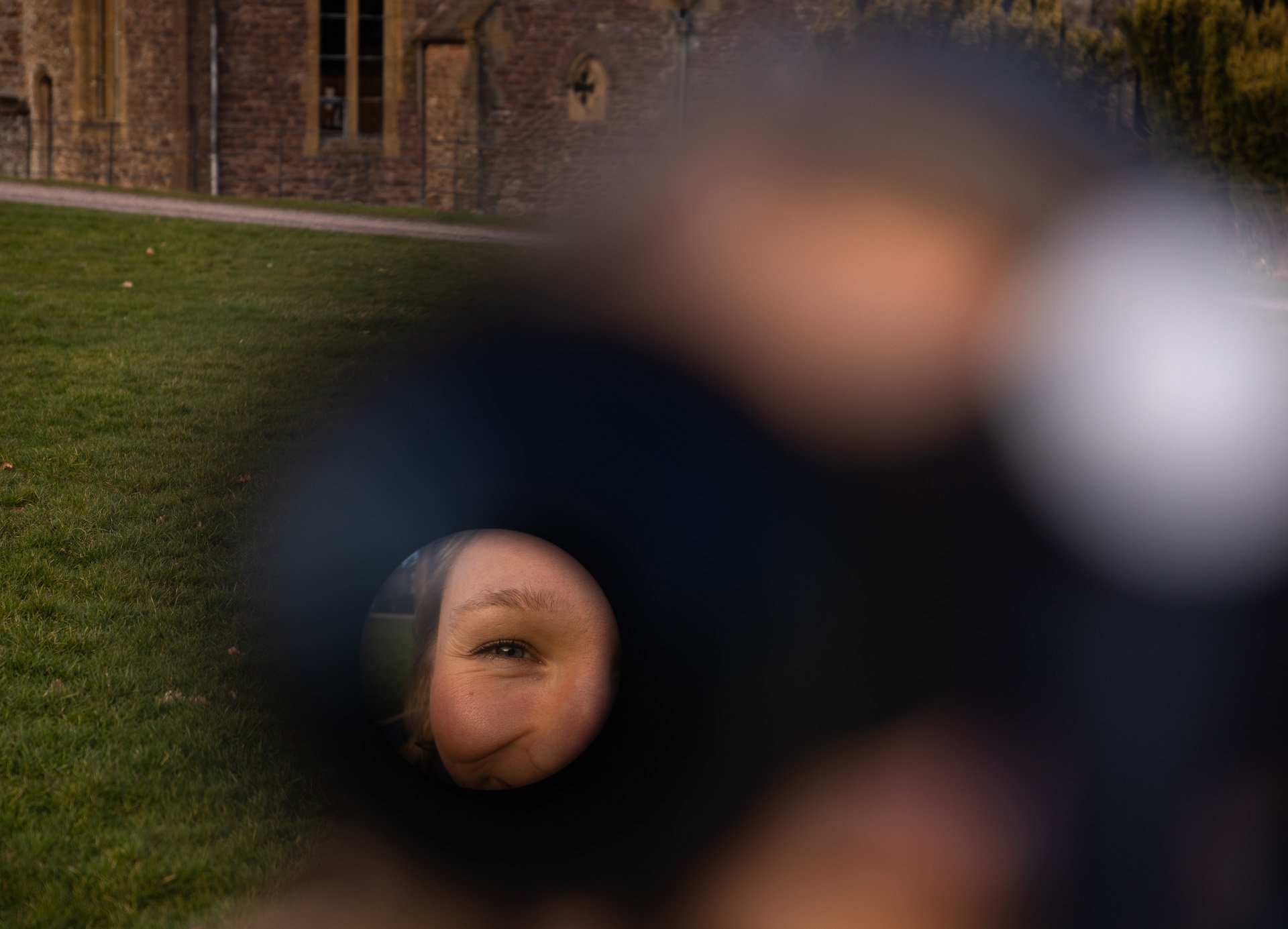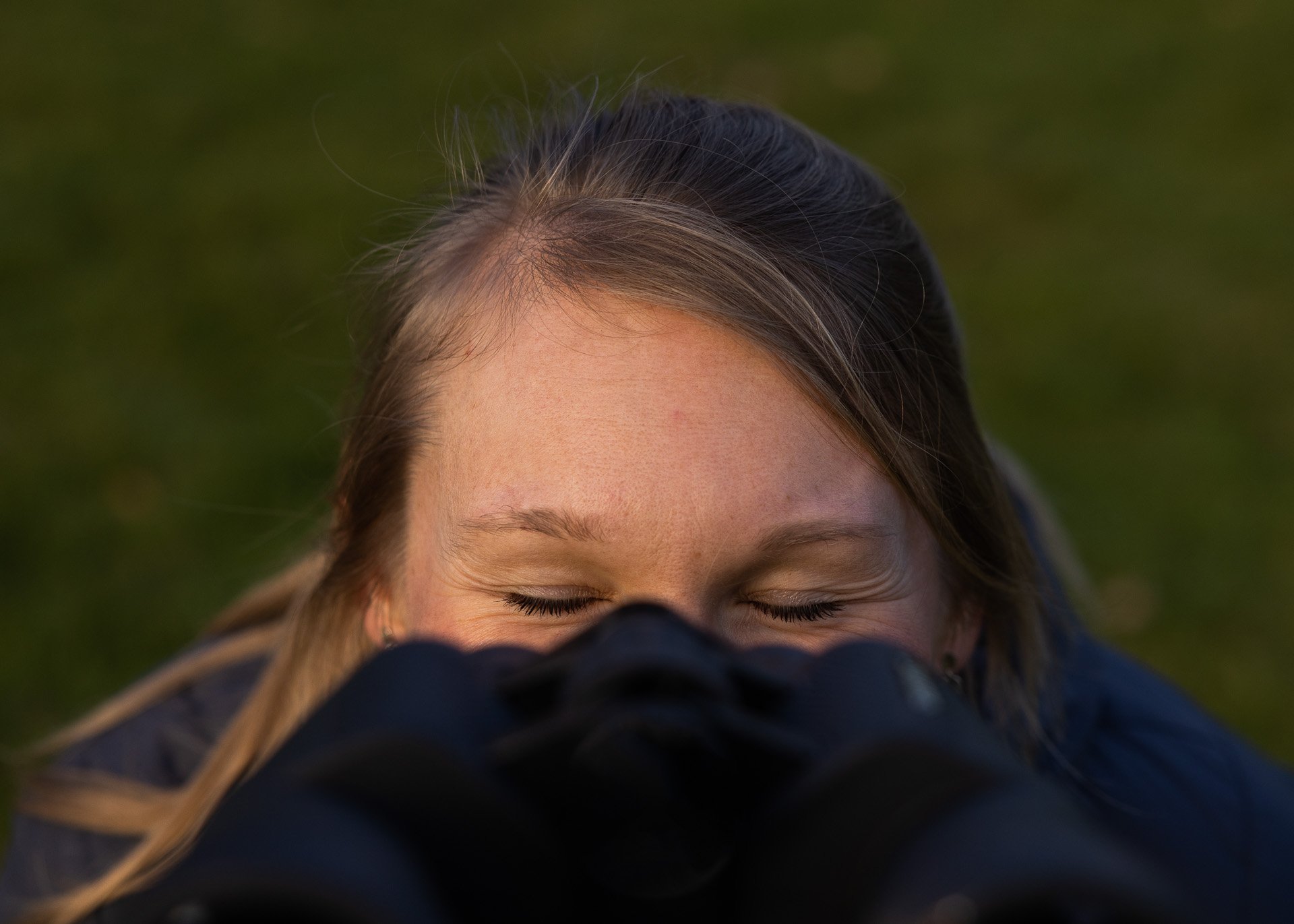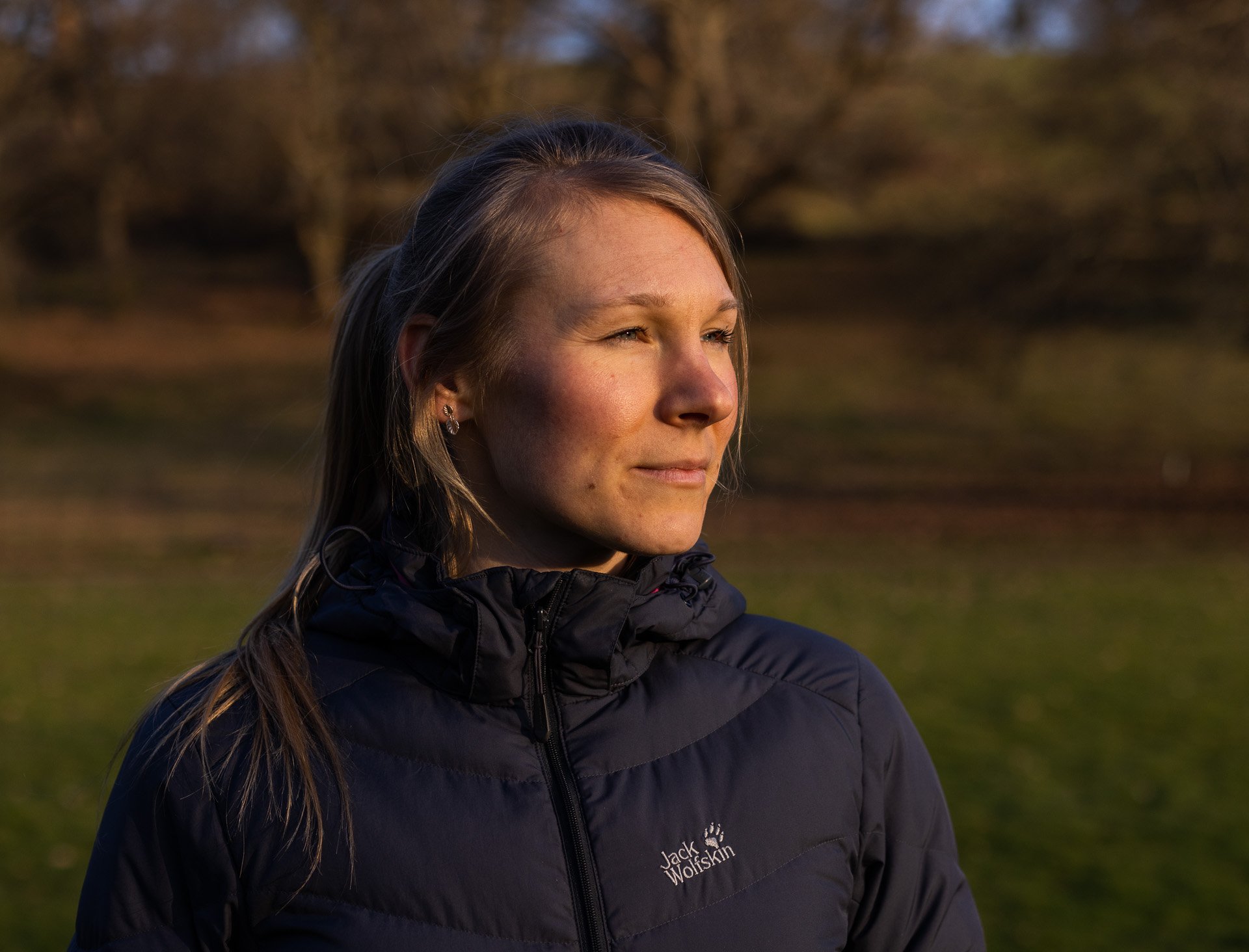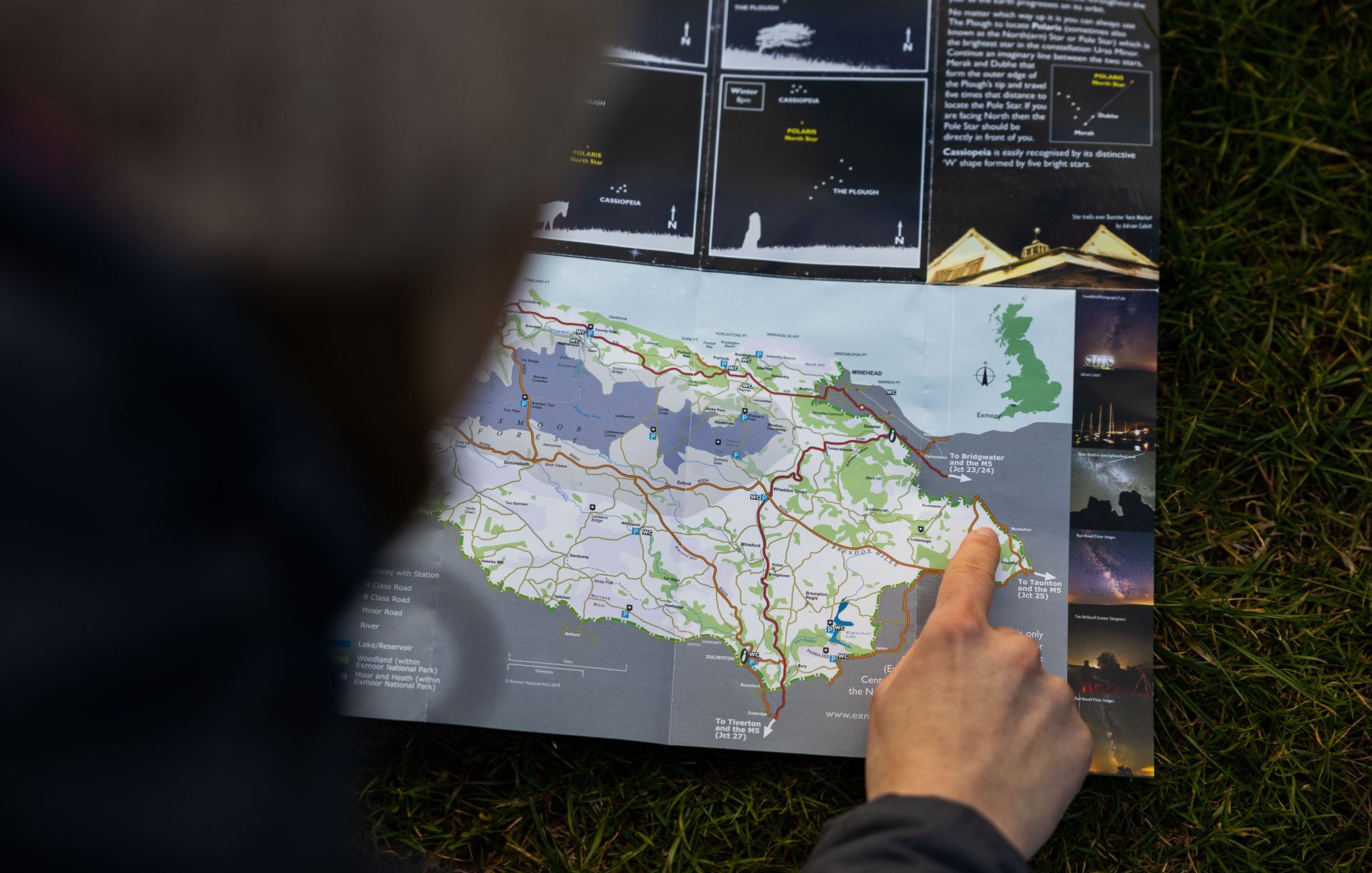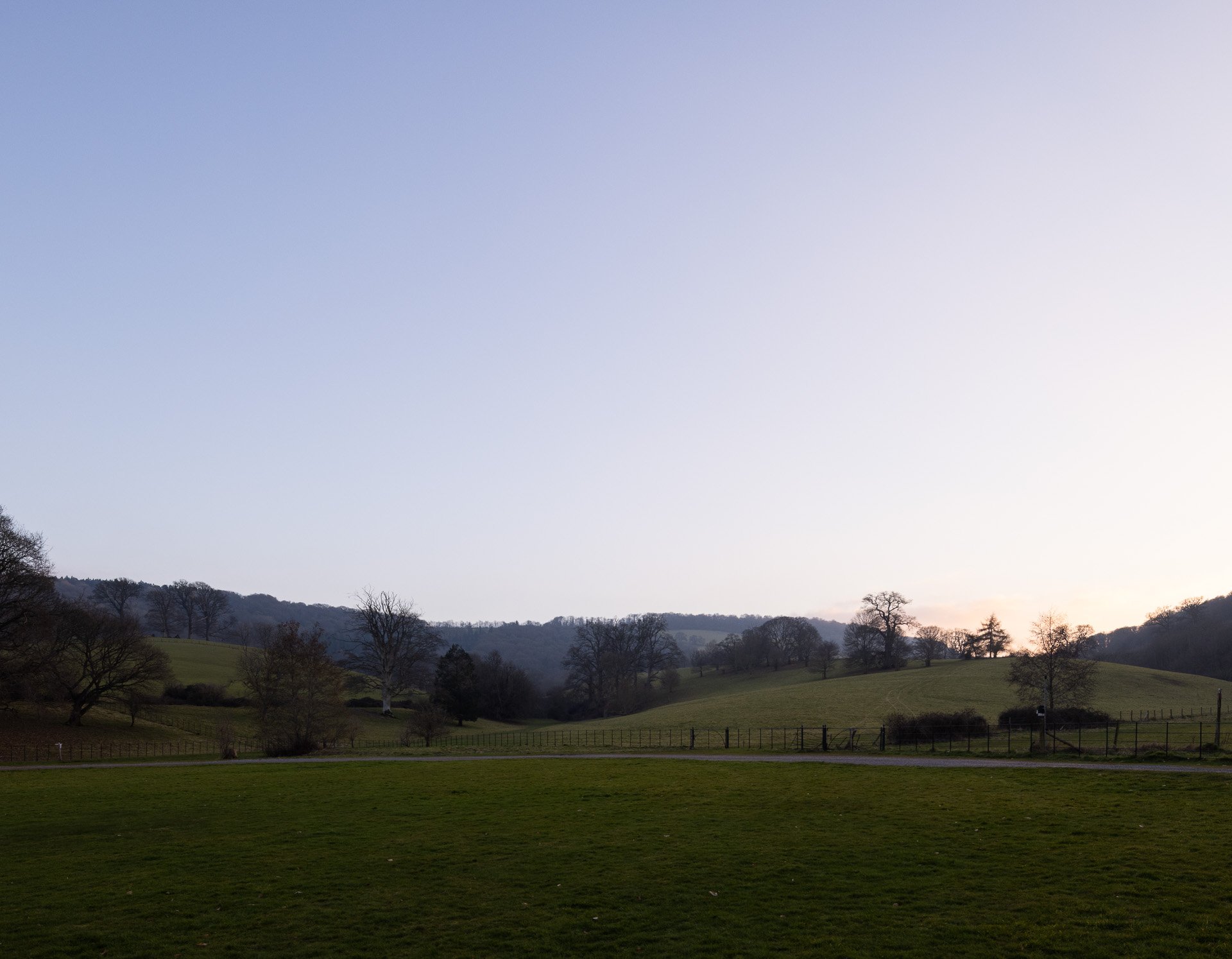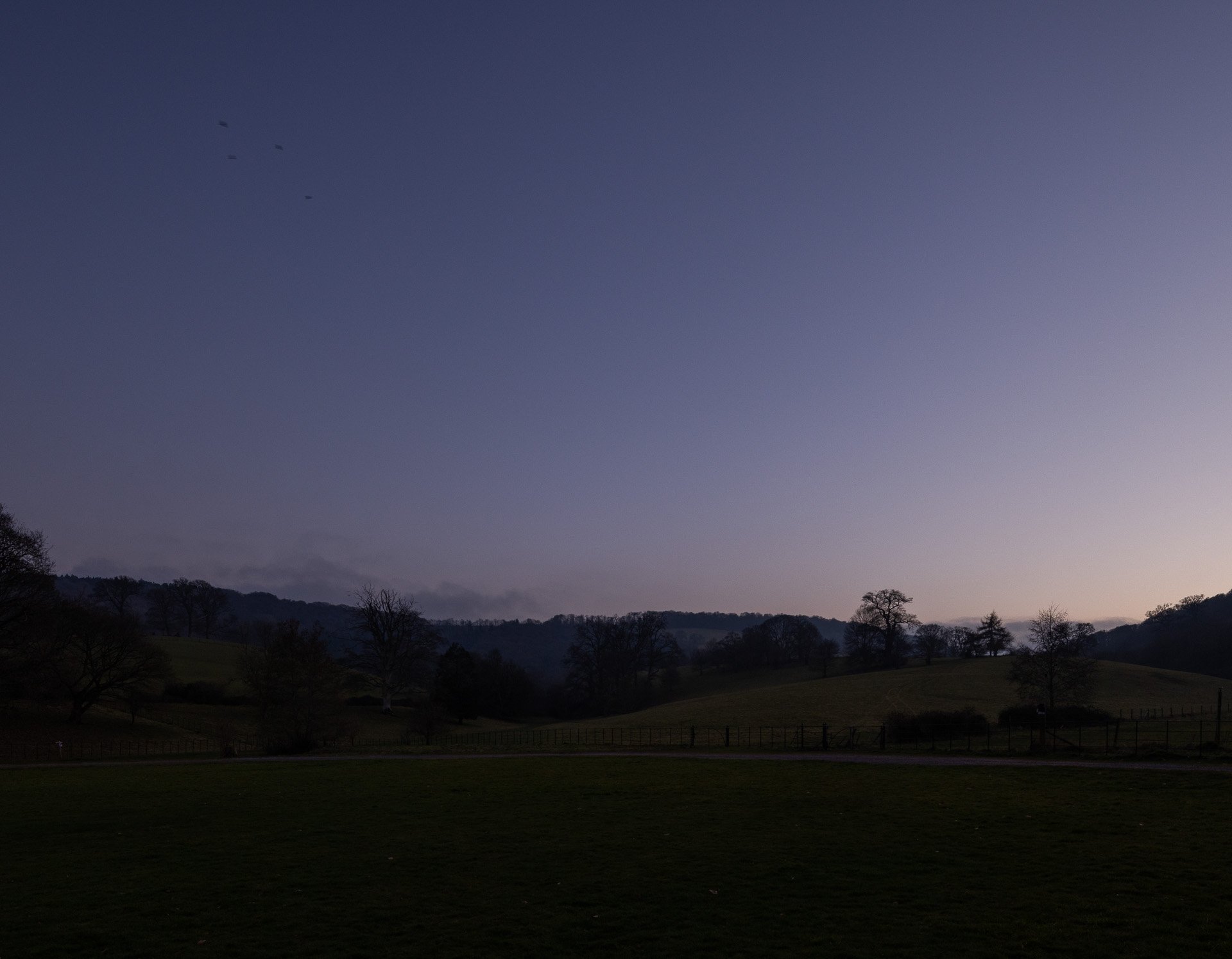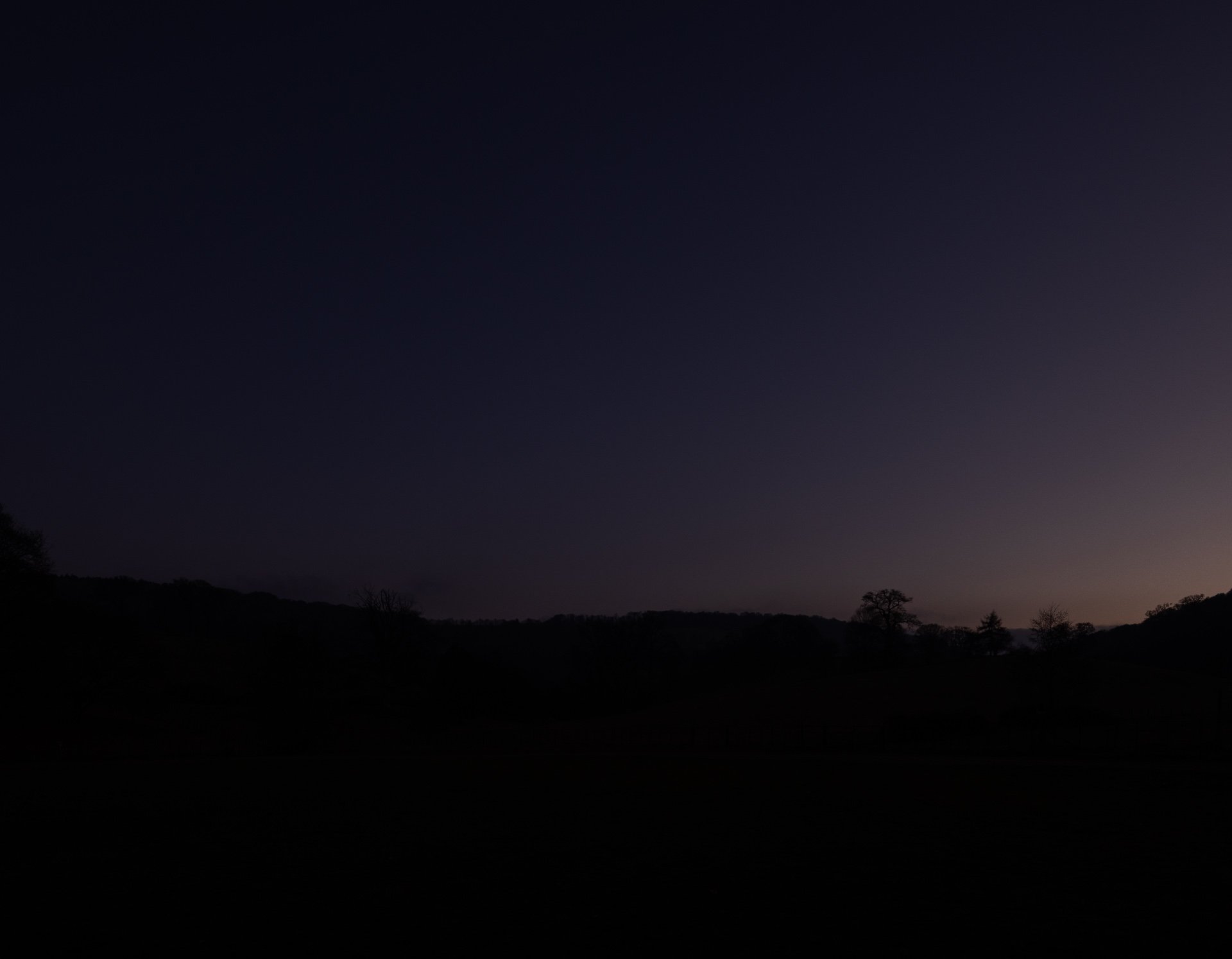“The arrival of the dark night sky always gives me a deep feeling of calm.” Stargazer Liz in Exmoor National Park.
How often do any of us take the time to really watch the sun set from the first tiny twinges of light dropping to absolute pitch darkness? That’s exactly what we do on a crisp winter evening, in a secluded corner of Exmoor National Park.
We arrive in a wash of late afternoon sunlight, below a pale sky with just a smattering of cloud, holding the elusive promise of clear conditions for stargazing.
The house before us is a majestic Tudor and Georgian mansion, surrounded by expansive heritage parkland. Nettlecombe Court is run by Field Studies Council as a space for schools, colleges and universities to conduct fieldwork.
We’re here to meet stargazer Liz in the field nearby. As we pull up, she’s already in full flow of setting up her equipment, dressed in warm layers, a warm smile spreading over her face.
Her excitement for the night-time build-up that is about begin already feels palpable. Showing us the heavy telescope that she heaves across the grass into position and a set of binoculars pointing skyward, the anticipation grows.
Liz is quick to point out that there are also very accessible ways to stargaze, including free apps to view constellations, affordable binoculars, and many opportunities to view the night sky with the naked eye.
Her metal instruments have a surreal quality stood against the soft green tones, pointing at the lowering sun. It’s hard to imagine how different the landscape will soon become.
For Liz, her love for stargazing and strong affinity to nature began through exploring early in life. Her family is originally from Poland, and she spent her childhood camping with the Polish Scouting Association.
Her first encounters during these trips with rural skies in Wales were breath-taking and seeing the night sky above the Italian foothills of Monte Cassino captivated her.
Liz’s life journey since has taken her further into the outdoors, from Duke of Edinburgh Expeditions, to studying Biodiversity and Conservation at university, to working as an Ecologist consultant, to teaching as a Field Studies Council Tutor, to working for Exmoor National Park Centre.
Then recently she founded a business to help people discover nature for themselves, including the night sky, a cosmological landscape to see afresh every night.
But her path to confidently striking her own way and building a career around inspiring others was not always easy. Describing herself as a quiet child absorbed in nature, she was often bullied.
Through stargazing she experienced some of her first moments of connection with her peers that would shape her future.
“One of our Polish Scout camp themes was ‘Mleczna Droga’ which means ‘Milky Way’. We lay back on blankets watching an incredible meteor shower.”
“Before that, the other girls would never engage with me. Whilst we were lying there, it was different in the darkness. We couldn’t see each other, and only hear our voices. I began pointing out shooting stars in the sky and other things they hadn’t noticed, teaching them.”
“As we talked more, I began to build friendships and they appreciated me for the first time. I will never forget that, lying under the shooting stars.”
Liz had discovered a talent in bringing people together. Being of a different cultural background growing up in England came with its challenges, but it has also given her empathy for others.
Through her stargazing workshops, she understands that the night sky becomes an ethereal equaliser, uniting everyone in awe at what’s out there.
“Recently a seventy-five-year-old man from Essex said he had never seen the Milky Way and a Spanish woman cried as she saw Saturn for the first time. That is why I love what I do, witnessing these sorts of reactions.”
Discovering Exmoor’s Dark Skies Reserve protection status when she moved to Exmoor a few years ago, Liz hired a telescope and was immediately hooked.
There are significantly more opportunities to see rare, beautiful sights in the wilderness. She describes how emotional it feels to see craters on the moon or a galaxy 2.5 million light years away.
Exmoor is perfectly located to allow an unrestricted view of the wonders of the sky, but Liz points out that anyone in Britain can find spots nearby to see stars and planets on a clear night.
As we stand and wait for the light to petter down, a hush grows over the valley, with an occasional rustle of leaves. Liz stands with her telescope, poised. We drink cups of tea, as the cold sets in.
An essential part of stargazing seems to involve immense patience and stillness, a rarity in hectic everyday life. It feels especially impressive in these winter conditions.
Succumbing to the elements, as the earth turns on its tilt, and the night unfolds has a timeless quality to it, like witnessing a natural motion that has been replayed endlessly.
For Liz this steady feeling where she can predict exactly what will happen next is a daily boost for her wellbeing.
“The arrival of the dark night sky always gives me a deep feeling of calm. There' s no sensory overload. Its amazing what you can experience and capture when things are still.”
“It takes us back 20,000 years when our ancestors were around. The things they would have seen during the day would have been similar in stimulation to night-time, creating balance.”
“When I have a chaotic mind during the day, it’s reassuring knowing that dusk will come again and eventually it will be just me, the rabbits in the fields, and the constellations.”
Liz says that hearing the song thrush sing its final song and the tawny owl echoing in the distance prepares her for the night-time in a gentle calming way.
Standing still, it’s striking to witness the three phases of nightfall before us: civil twilight, nautical twilight, and astronomical twilight, signifying the steady movement of the sun below the horizon.
We watch the hills shift shape and the colours gradually dilute into a final glow before darkness.
The first visible speaks of light to appear are Saturn and Jupiter. Through the telescope, Liz shows us shapes on the surface of Jupiter and its moons that flicker into focus. She uses her iPad to pinpoint exactly how the planets fit alongside the stars that will soon emerge.
Liz feels a special connection to certain constellations, particularly Orion the Hunter and the Andromeda Galaxy.
She points out Orion who is easy to find with a distinctive ‘belt’ of stars and a range of other shapes around him, including the ‘horsehead nebula’ sitting in his ‘sword’, Betelgeuse the bright orange star on his top left shoulder, Mars to its right and Pleiades, known as ‘Seven Sisters’ to the right of Mars.
Liz explains that the Greeks created these concepts of creatures in the stars, the signs of the Zodiac, to help teach their children about what the sky looks like for navigation purposes.
Stars have always been used to signify the change in seasons, something Liz finds comforting, a constant reminder of where we are in the lunar calendar.
We identify Cassiopeia, another constellation that is named after a queen in Greek mythology which has a clear ‘W’ shape. Liz still remembers the first time she saw it and Ursa Major or the ‘Black Bear’, an excitement that has never left her. Within Ursa Major is ‘Polaris’, the brightest star that is a perfect starting point for finding shapes in the sky.
‘The Plough’ or ‘Big Dipper’ is another constellation that can serve as a marker when stargazing. For people working in the fields this shape must have had a familiar reflection of a life lived outdoors.
As the darkness intensifies, the meaning of a dark sky zone becomes abundantly clear, with new layers of stars emerging. There is now a tapestry of rippling lights all around us.
We quickly forget the cold, absorbed in the spectacle of scattered formations. Liz uses her laser to point out what she spots, making the skyscape ever more memorable.
When it comes to darkness, a concept many of us find frightening and overwhelming, she feels affection towards it in giving her a mental focus for all areas of her life.
Standing under a looming sky, she describes feeling small and insignificant amid the power of the universe. This helps her to reframe her worries and reassess what is important.
Perhaps the legacy of sitting around a campfire in darkness really has left a long evolutionary trail in us all, an instinct to seek out the bigger perspective.
But amidst the climate crisis, stargazing is becoming more difficult. The increase in industrial light pollution and rise in satellites all around the world is creating a vast amount of wasted energy.
This intense exposure to artificial light can also negatively affect ecosystems and wildlife. Liz is hopeful that young people who attend her sessions and hear about these challenges can pave the way in decreasing light pollution and benefiting the environment.
In darkness, it’s easy to forget the existence of electricity until a lamp flicks on in the house nearby.
Being more in sync with natural light cycles of day and night is shown to benefit our mental and physical health. Stargazing provides a poignant window to that.
While we pack up the equipment, our numb fingers come into sharp focus. But the buzz from being under the stars is irresistible and it’s hard to drag yourself away, a sentiment echoed by Liz.
“After stargazing, it feels like I always need to stay out longer. By the end, I feel like I’ve completed a marathon, having seen so much.”
As we say goodbye, students from Nettlecombe House arrive and Liz is quickly absorbed in another constellation demonstration, chattering away enthusiastically.
With guides like her to lead the way, the night sky is truly bonding. No matter where you come from or who you are, we all exist under the same planets, galaxies, nebulae, and stars that have the power to bring us closer to each other and to ourselves.
We must simply remember to always keep looking up.
You can find Liz on Instagram @moor_wild_experiences and on her website at www.moorwildexperiences.co.uk


